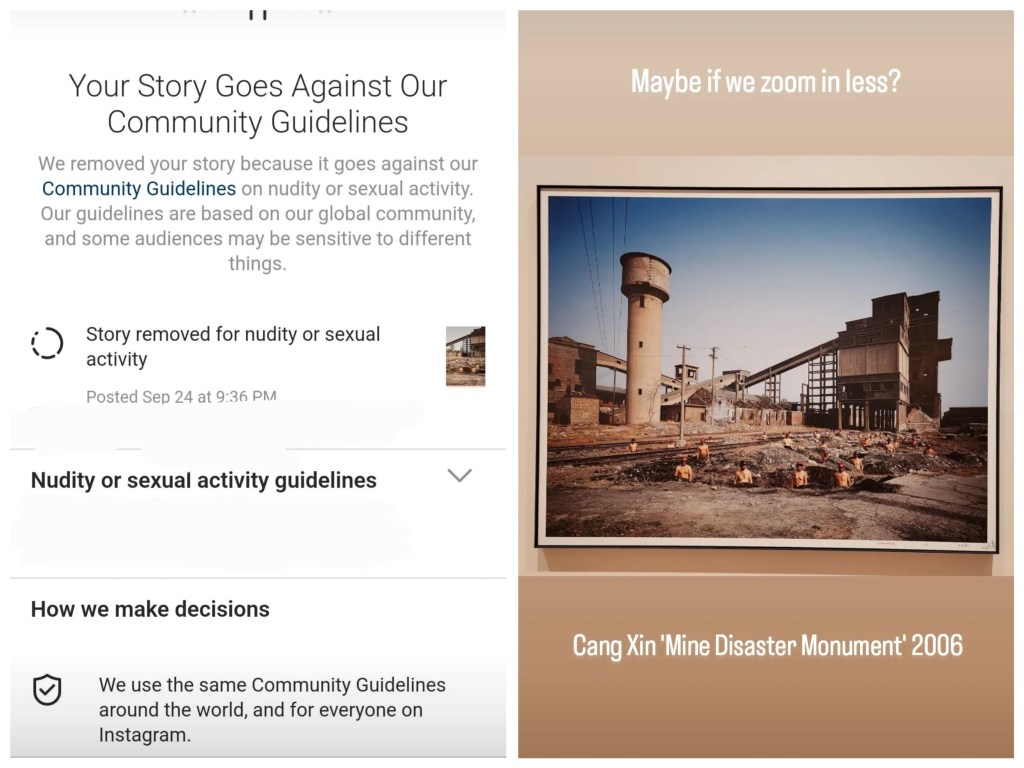It’s been three years since hundreds of naked protestors gathered at the Facebook (now Meta) New York headquarters with stickers of male nipples, pointing to the company’s nudity policy and censorship that discriminates against women.
Last week Meta’s Oversight Board – dubbed as the company’s ‘Supreme Court’ – overturned the company’s original decision to remove two Instagram posts that depict transgender and non-binary people with bare chests.
The two posts, one in 2021 and the other in 2022, were made by the same Instagram account from a US-based transgender and non-binary couple with image captions discussing transgender healthcare.
The Oversight Board stated in its key findings that ‘removing these posts is not in line with Meta’s Community Standards, values or human rights responsibilities. These cases also highlight fundamental issues with Meta’s policies’.
The Oversight Board’s decisions have sparked hope in the arts community that Meta is on the right track to change its Adult Nudity and Sexual Activity Community Standard, which currently closely regulates female nipple exposure and adopts a binary view of gender.
Here is a recap of Meta’s policy regarding nudity:
‘We understand that nudity can be shared for a variety of reasons, including as a form of protest, to raise awareness about a cause or for educational or medical reasons.
‘Where such intent is clear, we make allowances for the content. For example, while we restrict some images of female breasts that include the nipple, we allow other images, including those depicting acts of protest, women actively engaged in breast-feeding and photos of post-mastectomy scarring… We also allow photographs of paintings, sculptures and other art that depicts nude figures.’
The Oversight Board states that these exceptions are ‘often convoluted and poorly defined’ while the policy overall ‘results in greater barriers to expression for women, trans and gender non-binary people on its platforms’.
The policy encourages discrimination based on a binary view of gender, singling out ‘female nipples’ while suggesting that the only ‘appropriate’ reason for women to be bare chested is in a medical or maternal context.
The Board continues: ‘The consequences of Meta’s choices result in disparate opportunities for expression being made available to women, trans and gender non-binary people on its platforms. Meta’s current Adult Nudity and Sexual Activity policy treats female breasts and nipples as inherently sexual, and thus subject to prohibition, unless they have or will be operated on surgically or are in the act of breastfeeding.’
But does the ‘no nipple policy’ advocate against the sexual objectification of women on social media platforms? You don’t need to look far to see how much of an oversimplified fantasy that is.
Read: Are the arts too reliant on socials?
The Board advises Meta to ‘define clear, objective, rights-respecting criteria to govern its Adult Nudity and Sexual Activity Community Standard, so that all people are treated in a manner consistent with international human rights standards, without discrimination on the basis of sex or gender’.
Other recommendations include for Meta to ‘engage automated and human moderators to make more refined, context-specific determinations of when nude context is actually sexual, regardless of the gender of the body that it depicts’, as well as offering users greater control in content settings to limit the visibility of nude content for those who do wish to see it.
In Meta’s latest Community Standards enforcement report for Instagram (April-June 2022), 21% (or one in five) of the adult nudity and sexual activity removals that were appealed led to the content being restored, signalling the high number of false-positives and mistaken removals.
What about ‘other art’?
While Meta’s policy includes the mention of ‘other art’, Instagram’s own community guidelines only mention ‘paintings and sculptures’ as exceptions for nudity.
The definition of ‘other art’ is purposefully blurry, but art forms such as photography and video are at a clear disadvantage since Meta’s algorithm seems to determine whether nude imagery should be censored based on how ‘realistic’ it looks.
Plus, artificial intelligence (AI) (and sometimes people too) can’t differentiate between photography as art and, well, as a photo. The approach that moderators take is often to be better safe than sorry.
The policy can also disproportionately affect queer artists and performers. Australian artist Scotty So tells ArtsHub that he experimented with an AI-generated image where he is topless, but his face changed to that of a woman (he frequently performs as his drag persona Scarlett So Hung Son). The image was taken down by Instagram.
In its decision, the Oversight Board has not made any specific recommendations for art, or suggest exceptions that should apply to artistic contexts as well as medical and educational ones.
Art once again hits the roadblock of being immeasurable and difficult to quantify, while what sits at the opposite side of the spectrum runs the risk of artistic gatekeeping.
Read: What’s happening to arts censorship in the age of cancel culture?
The risk and frustration of censorship also has an impact upon an artist’s creativity as the art world sees cancel culture perpetuated at home and abroad. On the bright side, however, many have come up with creative ways to combat Meta’s nudity policy, even creating works in response to the need to cover up, while others join the wave of artists heading to OnlyFans, including some of Vienna’s historic museums.

The Board has requested a report on the assessment and plan of Meta’s Adult Nudity and Sexual Activity policy six months from the decision’s announcement (18 January 2023). According to The New York Times, Meta will publicly respond to each of the Board’s recommendations by mid-March 2023.
Read the Oversight Board’s ‘Gender identity and nudity’ report.





